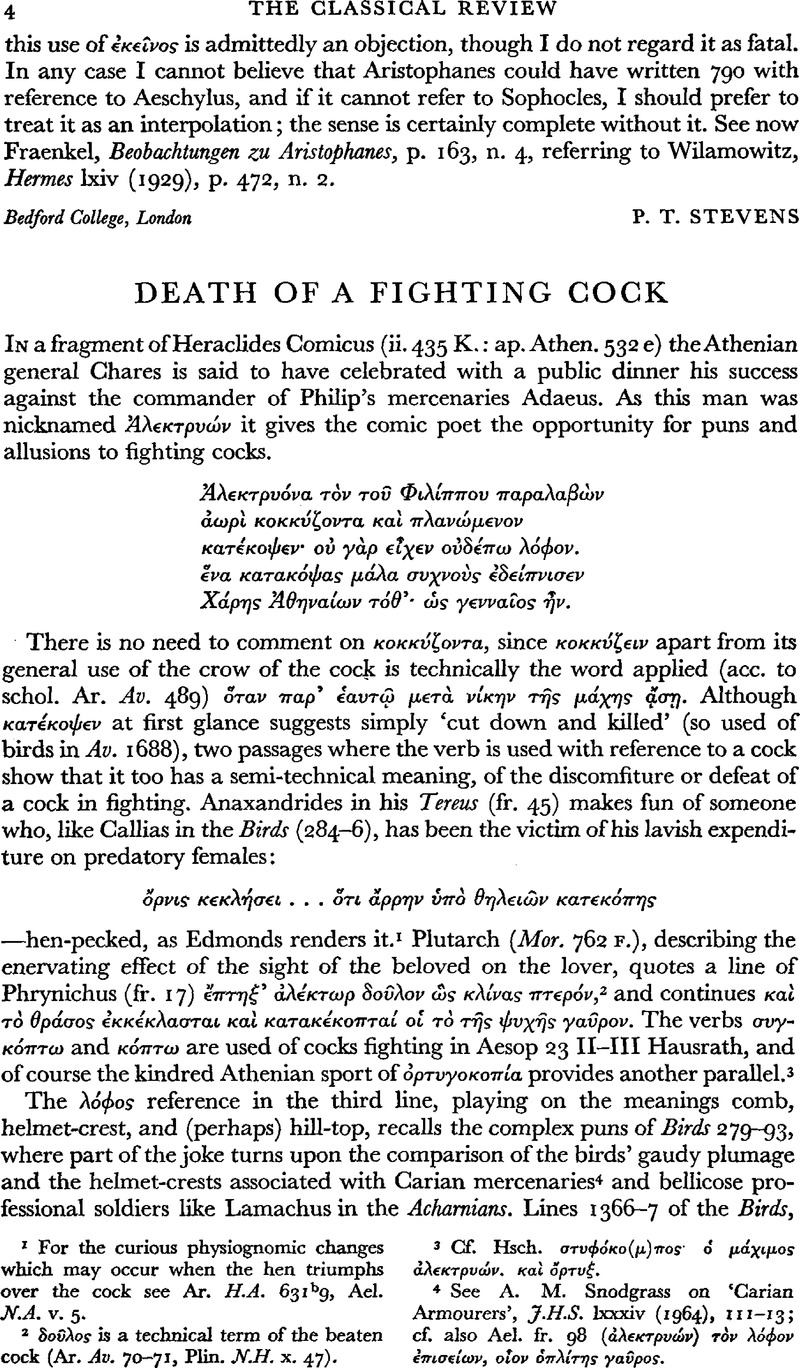No CrossRef data available.
Article contents
Death of a fighting cock
Published online by Cambridge University Press: 27 February 2009
Abstract

- Type
- Review Article
- Information
- Copyright
- Copyright © The Classical Association 1966
References
page 4 note 1 For the curious physiognomic changes which may occur when the hen triumphs over the cock see Ar. H.A. 631b9, Ael. N.A. v. 5.
page 4 note 2 δο⋯λος is a technical term of the beaten cock (Ar. Av. 70–71, Plin. N.H. x. 47).
page 4 note 3 Cf. Hsch.στυφ⋯κο(μ)πος ⋯ μ⋯χιμος⋯λεκτρυών. κα⋯ ⋯ρτυξ.
page 4 note 4 See Snodgrass, A. M. on ‘Carian Armourers’, J.H.S. lxxxiv (1964), 111–113Google Scholar; cf. also Ael. fr. 98 (⋯lambda;εκτρυών) τ⋯ν λ⋯φον ⋯πισ⋯ων, οἶον πλ⋯της γα⋯ρος.
page 5 note 1 Doubtless the modern soldier's equivalent expression would be that he was caught with his trousers down.
page 5 note 2 Note that ⋯ποπηδ⋯σαντες sustains the imagery here: the cock prematurely leaps off its rival, or the hen it has been treading (or perhaps the τηλ⋯α on which it has been fighting), just as ⋯πιπηδ⋯ω is used in Ar. H.A. 539b32 ⋯πιπηδ⋯ν ⋯χε⋯ει: cf. Pl. Phdr. 254 A. Erasmus (Adagia, p. 692) cites a proverb Ἀλεκτρυών ⋯πιπηδᾷ, id est, Gallus insilit, ubi quis semel victus redintegrat certamen.
page 5 note 3 As παραλαβών has no obviously appropriate military meaning, Meineke proposed καταλαβών: but one of the commonest meanings of the former is ‘to invite to a feast’ (so used in Alciphr. Ep. iii. 48). The series of incidents παραλαβών—ἔνα κατακ⋯ψας—συχνο⋯ς ⋯δε⋯πνισεν could then be connected: Adaeus, the Cock, was invited to dinner by Chares—not however where he ate, but where he was eaten.
page 5 note 4 Collectanea critica, epicritica, exegetica (1903), 136–7.
page 5 note 5 Cf. Plato, Lys. 205 D and schol.πρ⋯ τ⋯ςν⋯κηςᾄδεις τ⋯ ⋯γκώμιον ⋯π⋯, ⋯π⋯ τ⋯ν τ⋯ πρ⋯γματαπρολαμβαν⋯ντων .
page 5 note 6 See my article ‘Two emendations in Alciphron's Epistles’ (C.R. lxxix [1965]).
page 5 note 7 Cf. also Philes, de anim. propr. 340–1 (de gallinaceo) ⋯λεκτρυὼν μ⋯ντοι γε νικ⋯ν τ⋯νμ⋯χην / σφριγᾷ καθαρ⋯ς, κα⋯ σοβεῖ, κα⋯ τ⋯ρπεται.


